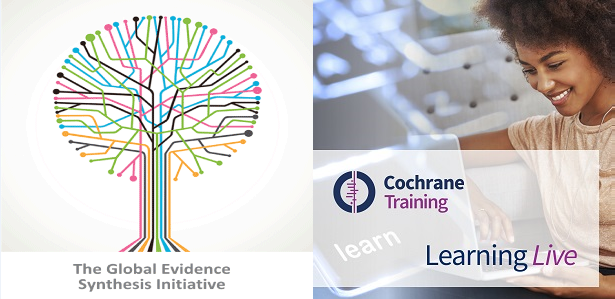In these videos from a Cochrane Learning Live webinar delivered in partnership with GESI: the Global Evidence Synthesis Initiative, Dr Etienne V. Langlois, Dr Andrea C. Tricco, and Prof John Lavis talk about the use of rapid reviews to strengthen health policy and systems and the methods of conducting the rapid reviews. In their presentations, they are referring to the WHO publication ‘Rapid reviews to strengthen health policy and systems: a practical guide’ (available throught the link below).

The webinar was delivered in October 2017. Below you will find slides from the webinar [PDF] as well as edited videos covering:
- Usefulness of rapid reviews and their application to health policy
- An overview of rapid review methods
- How to engage knowledge users in the conduct of rapid reviews
- Examples of EVIPNet-affiliated rapid evidence services
Presenters bios:
Dr Etienne V. Langlois from Alliance for Health Policy and Systems Research (HPSR), World Health Organization, Geneva, Switzerland, is an epidemiologist specialized in health systems research, maternal and neonatal health care services, and knowledge synthesis. Trained in medicine, global public health and epidemiology, he manages for the WHO Alliance HPSR various portfolios of work on primary health care systems, health systems research synthesis, implementation research and embedded research, placing evidence-to-policy at the centre of its activities. Dr Langlois’ research focuses on skilled birth attendance and postnatal care services in low- and middle-income countries (LMICs), as well as methods to advance embedded research and health systems research synthesis. His previous positions include researcher and lecturer in clinical epidemiology and global health at the Faculty of Medicine, University of Montreal, Canada. He lived in Burkina Faso and worked in numerous LMICs, an experience which led him to be a strong advocate of evidence-informed interventions to support health equity and universal health coverage.
Dr Andrea C. Tricco (PhD, MSc) from the Li Ka Shing Knowledge Institute of St. Michael’s Hospital, Toronto, Canada, holds a Tier 2 Canada Research Chair in Knowledge Synthesis. Her research interests are related to responding to knowledge users (including patients, healthcare providers, and policy-makers) through knowledge synthesis. Her research also focuses on advancing the science of knowledge synthesis and she is leading research projects related to rapid reviews, network meta-analysis, and scoping reviews.
Prof John Lavis holds the Canada Research Chair in Evidence-Informed Health Systems. He is the Director of the McMaster Health Forum (and Forum+), Co-Director of the World Health Organization (WHO) Collaborating Centre for Evidence-Informed Policy, Associate Director of the Michael G. DeGroote – Cochrane Canada Centre, and Professor in the Department of Health Evidence and Impact at McMaster University.
Part 1: Usefulness of rapid reviews and their application to health policy
Part 2: An overview of rapid review methods
Part 3: How to engage knowledge users in the conduct of rapid reviews
Part 4: Examples of EVIPNet-affiliated rapid evidence services
Link:
Rapid reviews to strengthen health policy and systems: a practical guide
Downloadable files:
![]() Etienne V. Langlois presentation slides [PDF]
Etienne V. Langlois presentation slides [PDF]
![]() Andrea C. Tricco presentation slides [PDF]
Andrea C. Tricco presentation slides [PDF]
![]() John Lavis presentation slides [PDF]
John Lavis presentation slides [PDF]
Author information:
Langlois, Etienne; Tricco, Andrea; Lavis, John; Lotfi, Tamara; Sambunjak, Dario
